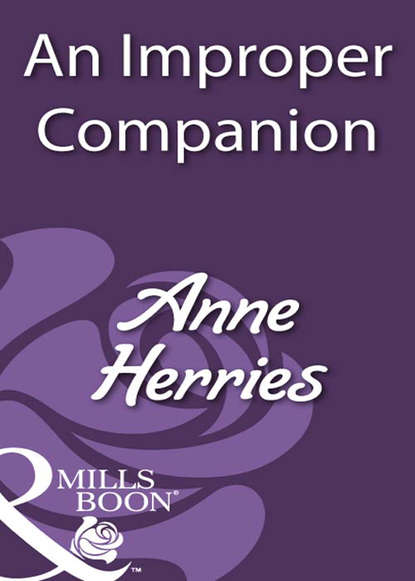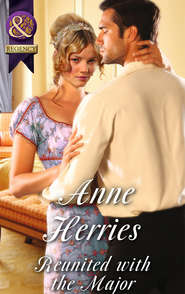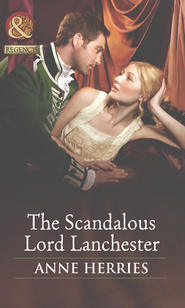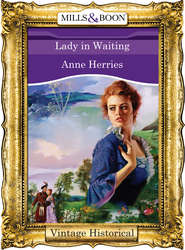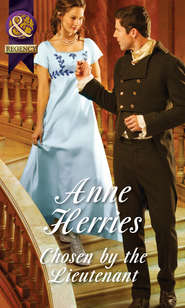По всем вопросам обращайтесь на: info@litportal.ru
(©) 2003-2025.
✖
An Improper Companion
Настройки чтения
Размер шрифта
Высота строк
Поля
‘I’m sorry, miss, for I dunno how the mistake was made—and there’s little I can do about it now, for the gentleman has taken the room.’
‘Oh, well, I suppose there is no help for it. Have you a truckle bed for my maid to sleep in?’ She saw the denial in his face. ‘You do not expect us to sleep in the same bed?’
She saw that he did and sighed inwardly. Mary was a large girl and she snored. Elizabeth knew that for a fact, because she had fallen asleep in the carriage and after some half an hour or more she had been forced to wake the girl up.
She turned back Mary, who had lingered behind her, making faces at the young lad who was carrying tankards of ale through to a private parlour.
‘Come along, Mary,’ she said, just as the door of the private parlour opened and two gentlemen came out. ‘It seems that the landlord has let one of our rooms to someone else, which means that you will have to sleep in my bed.’
‘But I snore, miss,’ Mary said looking as alarmed as Elizabeth felt. ‘’Tain’t right you should have to share with me. Tell him as you want the rooms you sent for, miss.’
‘I have already done so,’ Elizabeth said. ‘Unfortunately, there is nothing we can do. You must make up your mind to it, Mary.’
‘But I kick, miss. Leastways, my sister allus said as I did when we were children.’
‘Come along, Mary. I have told you, the room is let and we must make the best of things.’
‘Excuse me, ma’am.’ One of the two gentlemen from the parlour came towards her. ‘I could not help overhearing your maid. I think I may have taken one of your rooms. Please forgive me for any inconvenience. I shall have the landlord move my things immediately.’
‘There ain’t no more rooms, Mr Elworthy,’ the landlord objected. ‘You’ll have to sleep with the other gentleman or over the stables.’
‘I shall be quite happy with the stables,’ John Elworthy said and smiled at Elizabeth. ‘I think that perhaps I have the best of the two rooms. If you would care to sit in the parlour for a few minutes, I am sure the landlord can make all right. Perhaps you wish to take supper?’
‘I had thought the parlour would be ours,’ Elizabeth said. She had stiffened at the mention of his name and did not wish to be obliged to him, for she could not help wondering if he were the same Mr Elworthy who had been a witness to her father’s ruin. ‘But I believe we shall do well enough in our rooms—if the landlord would be good enough to send us some supper up?’
‘Yes, of course, miss. Just you wait in the parlour for a moment or two and my wife will fetch you as soon as maybe.’
‘I would give the parlour up to you,’ John Elworthy said and glanced awkwardly towards the stairs, up which the second gentleman had disappeared. ‘However, Sir Montague has bespoken his supper there and I fear he would not accept a move to the taproom.’
‘You are here with that man?’ Elizabeth looked at him in horror. ‘If he is using the parlour, then I shall not set foot in it. Indeed, I do not think I can stay here at all this night…’
She turned to leave, but Mr Elworthy caught her arm urgently. ‘You know something of Sir Montague Forsythe?’
Elizabeth looked back at him, her face pale. ‘He—and I think perhaps you in part, sir—were responsible for my father’s ruin and his death.’
It was Mr Elworthy’s turn to look shocked. ‘Then you must be…’
‘Yes, sir. I am Elizabeth Travers.’ Her eyes were bright with a mixture of anger and accusation as she looked at him. ‘I had not thought you such a close friend of Sir Montague, but since you are travelling together—’
‘Indeed, Miss Travers, you wrong me.’ John Elworthy hesitated, and then, ‘Would you do me the honour of stepping into the parlour for one moment? I have something I would wish to say to you in private.’
Elizabeth was inclined to refuse, and yet he seemed a steady, pleasant man, not handsome by any means, but with an attractive manner. And of course this was the opportunity her brother had sought and been refused. She inclined her head and went in front of him into the parlour, leaving Mary to wait for her in the hallway.
‘Well, sir—what have you to say to me?’
‘Firstly, I wish to say that I was never more shocked in my life than when I heard what had happened to your father, Miss Travers. I knew him only slightly, but had not thought him a man to gamble so carelessly. Nor did I expect that he would—’ He shook his head and looked grave. ‘But I did see him in the company of Sir Montague and I happened to hear the wager he made on that horse race, for I was standing next to their party. I would say that Sir Edwin had been drinking unwisely and that he spoke recklessly.’
‘You were standing next to Papa when he made the wager?’
‘Yes, I was. I thought it foolish, but it was not my affair. I wish now that I had remonstrated with him, but of course I could not—a wager is, after all, a matter of honour between gentlemen and once accepted cannot be taken back.’
‘But if Papa was drunk…’
‘I agree that no true gentleman would have accepted such a wager—but I fear that Sir Montague is not of such nice scruples.’
‘No, indeed, for we were given only two weeks to leave our home and we were not allowed any time to grieve.’
‘That was wicked indeed.’ Mr Elworthy looked distressed at the news of how harshly they had been treated. ‘He should be ashamed of himself!’
‘I had not thought you a friend to Sir Montague, sir? Lord Wentworth told me that your word was to be trusted.’
John Elworthy met the angry sparkle of her eyes. Miss Travers was a tall girl, attractive rather than pretty in his opinion, her figure shapely, her dark hair peeping beneath the brim of her bonnet. However, her eyes were lustrous and expressive and just now held a challenge that had to be answered. He could not tell her the truth, of course—which was that he had deliberately followed Sir Montague in order to have what seemed a chance meeting.
‘We travelled here independently. We are polite to one another socially—our estates are no more than twenty miles apart—but I have never been more than an acquaintance, I assure you. I hope you will believe me?’
‘Yes, I must do so since you tell me as a gentleman,’ Elizabeth said. ‘I have always believed there was some mystery in this matter of the wager, but—’ She broke off as the parlour door opened and another gentleman came in. He was in his middle years, a tall, heavy-boned man with a ravaged complexion and a long nose. Knowing that he must be the man who had, she still believed, in some way cheated her father, she gave Mr Elworthy a speaking look and left the room immediately.
As she went out into the hall, the landlord came to tell her that her room was now ready, and Mary beckoned urgently from the top of the stairs. Elizabeth went straight up, her head held proudly as she fought the rush of anger that had come over her as her father’s murderer entered the parlour. Nothing could alter the fact that he had caused her father’s death by taking that infamous wager.
‘We’re side by side, miss,’ Mary told her. ‘I shall be able to hear you if you call me in the night.’
Elizabeth doubted that, for the girl slept like one of the dead, but she smiled and nodded. She had not wanted to bring Mary at all, but Lady Wentworth had insisted that she ought not to travel alone, because it would be necessary to stop at an inn for one night on the way.
‘I do not think that likely,’ Elizabeth told her. ‘I intend to lock my door when I retire and I should advise you to do the same. I will require your help to unpack my things,’ Elizabeth added. ‘But I shall not need your services again this evening.’
After Mary had unpacked she left the room. Elizabeth took off her bonnet and travelling cape, laying them down on the stool at the foot of the bed. At that moment there was a knock at the door, and then the landlady’s wife entered with a tray containing a dish of cold meat, pickles and some bread and butter together with a glass of ale, a jug of water beside it.
‘You said as you wanted a light meal, miss?’
‘Yes, thank you, that will do very well,’ Elizabeth said. She might have wished for a cup of tea, but doubted that it would be worth drinking had she ordered it.
After the woman had left, she ate a little of the bread, with some butter. It was fresh and wholesome. Elizabeth had no appetite for the meat or pickle, and drank only a mouthful or two of the strong ale.
It was still light as she looked out of her window, and she felt restless, disinclined for sleep. Yet she felt it might not be prudent to go downstairs again, especially as Sir Montague was staying at the same inn. He probably had no idea of who she was—unless Mr Elworthy had told him after she left the room, of course—but she had no wish to meet him.
At least there was a decent supply of candles in her room, which meant she might read for a while before she slept. She would be glad to reach her journey’s end, she thought, for it had been tedious with only Mary for company. How different it might have been if her dear mama had been alive.
Elizabeth pulled a wry face. It was time to start thinking of the future—even though there was little to cheer her in that if the truth were faced. She must be at the beck and call of her employer, and though she believed that would be an easy task in Lady Isadora’s case, she might not always be in that lady’s service.
Sometimes, Elizabeth wondered what her life might have been had she accepted one of the three proposals she had received when she was nineteen. She had not been universally popular during her Season, but she had attracted some admirers. However, she had not felt that she wished to marry any of them, and her mother had told her that she should wait, that the right man was bound to come along. They had spoken of giving her another Season, but somehow it had not happened. Her father had been unwell one year, and then he had seemed to be anxious about his estate, and things had drifted—until he had died and the estate was no longer theirs.
No, she would not have wanted to marry any of the gentlemen who had asked her, Elizabeth decided as she began to brush her hair. In the soft candlelight her skin looked creamy and her hair had a reddish tint. Her features were perhaps a little plainer than was required for true beauty, but her eyes were remarkable. However, she saw none of this, for she was not in the habit of noticing her own appearance, except to make sure that her hair was tidy and her gown clean and respectable. She had gone into company very seldom these past two years, and had long ago given up hope of marriage. The best that might come her way now was to be an aunt to her brother’s children should he find himself able to take a wife.
Elizabeth read her book, which was a slender volume of poems that had come from her father’s library, and was one of the few items that she had managed to bring away with her. She and her mother had been told they might take only personal possessions, and the book had been amongst her things for she often read at night. Lady Travers had taken a few pieces of silver, which had been personal gifts to her, but all else was denied them. Those silver items remained at Worth Towers, for Elizabeth believed they might be sold for a few guineas, and her brother would have need of money when he came down from Oxford if he were to have time to look about him for a suitable position.
Somehow she could not see Simon as a lowly clerk, but it would not be easy to find a post as an estate manager. Perhaps she would talk to him when he came down, try to discover what he would truly wish to do if he had the choice.
‘Oh, Papa,’ Elizabeth murmured as she got into bed. ‘I do wish you had not made that wager…’





